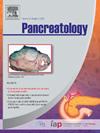Progression of resectable pancreatic ductal adenocarcinoma during surgical delay and effects on survival – A propensity score matched study
IF 2.8
2区 医学
Q2 GASTROENTEROLOGY & HEPATOLOGY
引用次数: 0
Abstract
Background
Surgery is the only curative treatment for pancreatic cancer, but less than 25 % of the patients present with a resectable tumor at the time of diagnosis. The aim of this study is to evaluate progression during surgical treatment delay and examine any associations between surgical treatment delay and survival.
Methods
This is a retrospective, single center propensity score matched study including treatment naïve patients with pancreatic adenocarcinoma between 2018 and 2022. Outcomes included disease progression during surgical treatment delay in patients where follow-up imaging was performed as well as overall and recurrence-free survival for the entire cohort.
Results
The study cohort consisted of 290 patients of whom 129 (44.5 %) underwent follow-up imaging. Radiological progression to unresectable disease during surgical delay was seen in 14 cases (10.9 %), with another 17 cases (13.2 %) deemed unresectable during intended resection. Tumor size progression was observed in 29 patients (22.5 %) with an average tumor growth rate of 7.4 mm (95%CI 5.8–8.9, p < 0.001). Median time to surgery was 37 days with no observed associations between treatment delay and overall survival (HR = 1.02, 95%CI 0.76–1.38, p = 0.996), or the risk of recurrence (HR = 1.06, 95%CI 0.77–1.48, p = 0.709).
Conclusion
Progression in tumor size does not seem to affect survival in our study population. In general, surgical treatment delay in up-front resectable patients does not seem to be associated with survival or the risk of recurrence, but the optimal and maximal time to surgery as well as the optimal timing of the follow-up scanning remain unclear.
手术延迟期间可切除胰导管腺癌的进展及其对生存的影响-倾向评分匹配研究。
背景:手术是治疗胰腺癌的唯一方法,但不到25%的患者在诊断时存在可切除的肿瘤。本研究的目的是评估手术治疗延迟期间的进展,并检查手术治疗延迟与生存之间的任何关联。方法:这是一项回顾性、单中心倾向评分匹配研究,包括2018年至2022年间治疗naïve胰腺腺癌患者。结果包括手术治疗延迟期间患者的疾病进展,随访影像学检查以及整个队列的总生存率和无复发生存率。结果:研究队列包括290例患者,其中129例(44.5%)接受了随访影像学检查。14例(10.9%)在手术延迟期间放射学进展为不可切除的疾病,另有17例(13.2%)在预定切除期间被认为不可切除。29例患者(22.5%)观察到肿瘤大小进展,平均肿瘤生长速度为7.4 mm (95%CI 5.8-8.9, p)。结论:肿瘤大小进展似乎不影响我们研究人群的生存。一般来说,可预先切除患者的手术治疗延迟似乎与生存或复发风险无关,但最佳和最大手术时间以及最佳随访扫描时间尚不清楚。
本文章由计算机程序翻译,如有差异,请以英文原文为准。
求助全文
约1分钟内获得全文
求助全文
来源期刊

Pancreatology
医学-胃肠肝病学
CiteScore
7.20
自引率
5.60%
发文量
194
审稿时长
44 days
期刊介绍:
Pancreatology is the official journal of the International Association of Pancreatology (IAP), the European Pancreatic Club (EPC) and several national societies and study groups around the world. Dedicated to the understanding and treatment of exocrine as well as endocrine pancreatic disease, this multidisciplinary periodical publishes original basic, translational and clinical pancreatic research from a range of fields including gastroenterology, oncology, surgery, pharmacology, cellular and molecular biology as well as endocrinology, immunology and epidemiology. Readers can expect to gain new insights into pancreatic physiology and into the pathogenesis, diagnosis, therapeutic approaches and prognosis of pancreatic diseases. The journal features original articles, case reports, consensus guidelines and topical, cutting edge reviews, thus representing a source of valuable, novel information for clinical and basic researchers alike.
 求助内容:
求助内容: 应助结果提醒方式:
应助结果提醒方式:


